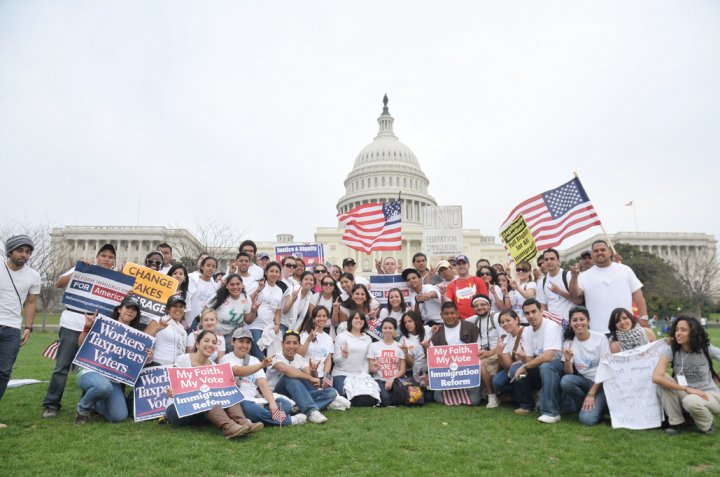
Words of a Dreamer: An Undocumented Student’s Story of the DREAM Act
November 1, 2011Policy/Contributor Blogs ArticleOn May 17, 2010—the anniversary of the landmark civil rights case Brown v. Board of Education—five students (Tania Unzueta, Mohammad Abdollahi, Yahaira Carrillo, Lizbeth Mateo and Raul Alcaraz) staged a peaceful sit-in in Senator John McCain’s Tucson office to support the Development, Relief, and Education for Alien Minors (DREAM) Act. Knowing they risked deportation, these students sought to catalyze a grassroots mobilization in favor of the DREAM Act. Meanwhile throughout the nation, college campuses hosted lectures and panels to inform their communities of the public policy affecting undocumented students.
Public policy arguments in favor of the DREAM act rely on “the assumption [that] the contributions made by undocumented immigrants outweigh their overall costs to society.” (Youngro Lee, To Dream or Not to Dream: A Cost-Benefit Analysis of the Development, Relief, and Education for Alien Minors (DREAM) Act, 16 Cornell J.L. & Pub. Pol’y 231, 245 (2006) (discussing policy arguments for and against the Dream Act)). Arguments in opposition to the passage of the Act rest on the illegality of undocumented students, the division between rights granted to citizen versus non-citizens, and issues relating to national security. Id. at 251–53.
Despite the national campaigns in support of the educational reform, the DREAM act was not enacted in 2010 and there is yet to be a national education policy to address the needs of undocumented students. But hope is on the horizon, as indicated by California Governor Jerry Brown, who recently signed legislation to extend state financial aid eligibility to undocumented immigrants. It is evident that a strong appreciation for this country and for the value of higher education is at the forefront of this movement. The Latin American Student Association and Cornell Advocates for Human Rights recently hosted a lecture at Cornell Law School with Isabel Castillo—a remarkable DREAM Act activist and undocumented youth. Kemi Bello, Texas-based policy writer and co-fouder of the student group DREAM Activist, discusses the story of Isabel Castillo below.
 For students in the United States facing economic uncertainty and diminishing job prospects, college graduation can be nerve-racking. For undocumented youth, higher education and graduation present additional roadblocks.
For students in the United States facing economic uncertainty and diminishing job prospects, college graduation can be nerve-racking. For undocumented youth, higher education and graduation present additional roadblocks.
“I had two options after college graduation: one – idly wait for our immigration laws to change; or two – reclaim my humanity, declare myself undocumented and unafraid, and be at the forefront of the immigrant struggle. As cliché as it sounds, I chose option 2, to be the change that I wish to see.”
Those are the words of Isabel Castillo, an undocumented youth and advocate from Harrisonburg, Virginia. She recently spoke at Cornell Law School on her personal experiences with the broken immigration system in the United States.
Isabel was brought to the United States at the age of six. Her parents, whose schooling in Mexico ended after the third grade, wished a brighter future for their children. Isabel began her schooling in Virginia and graduated in the top ten percent of her high school class, before earning a bachelor’s degree in Social Work from Eastern Mennonite University. However, due to the limitations and long backlogs of our immigration system (both of which emphasize the detention and deportation of undocumented immigrants), Isabel cannot practice in her field nor live her life free of the fears resulting from her lack of documentation.
Instead of allowing her potential to be squashed by immigration policies, Isabel has dedicated her efforts to the DREAM Act. The Act would provide undocumented students raised in the United States a pathway to permanent residency. If passed, youth that immigrated to the United States before the age of fifteen would be placed on a path to conditional permanent residency. Under the Act, students will be required to attend an institution of higher education or serve in the military. They must also evince good moral character and maintain a continuous presence in the United States. Only when these requirements are fulfilled would the undocumented student be able to apply for conditional permanent residency.
Congress came close to codifying the DREAM Act in December 2010. Though it passed the House, the Act was just a few votes shy of the majority needed in the Senate. Without a viable legislative solution, undocumented youth continue to face detention and deportation. They are forced to say goodbye to the only country they have known since they were six years, two years or even two days old. Isabel’s story is not unique, as hundreds of thousands of undocumented youth share her struggle. They continue to highlight the need for the passage of legislation, like the DREAM Act, that will reform our immigration system.
You may also like
1 comment
- November 2024
- October 2024
- April 2024
- March 2024
- February 2024
- November 2023
- October 2023
- April 2023
- March 2023
- February 2023
- January 2023
- December 2022
- November 2022
- October 2022
- May 2022
- April 2022
- March 2022
- February 2022
- January 2022
- December 2021
- November 2021
- October 2021
- May 2021
- April 2021
- March 2021
- February 2021
- January 2021
- November 2020
- October 2020
- September 2020
- August 2020
- July 2020
- June 2020
- May 2020
- April 2020
- March 2020
- February 2020
- January 2020
- November 2019
- October 2019
- September 2019
- April 2019
- February 2019
- December 2018
- November 2018
- October 2018
- September 2018
- March 2018
- February 2018
- January 2018
- December 2017
- November 2017
- October 2017
- September 2017
- May 2017
- April 2017
- March 2017
- February 2017
- December 2016
- November 2016
- October 2016
- April 2016
- March 2016
- February 2016
- January 2016
- December 2015
- November 2015
- October 2015
- June 2015
- May 2015
- April 2015
- March 2015
- February 2015
- January 2015
- December 2014
- November 2014
- October 2014
- August 2014
- March 2014
- February 2014
- January 2014
- December 2013
- November 2013
- October 2013
- September 2013
- May 2013
- April 2013
- March 2013
- February 2013
- January 2013
- December 2012
- November 2012
- October 2012
- September 2012
- June 2012
- April 2012
- March 2012
- February 2012
- January 2012
- December 2011
- November 2011
- October 2011
- September 2011
- August 2011
- April 2011
- March 2011
- November 2010
- October 2010
- September 2010
This provides a fascinating human spin on the DREAM Act. While there are legitimate arguments to be made regarding what should be done about immigration (and specifically how it should be reformed), stories like this serve as an essential backdrop to remind us that policy can help — or royally screw over — innocent people.
In any event, Isabel’s situation is ridiculous. Even for those worried about so-called “illegal” immigrants flooding into the education system, the US has absolutely no incentive to cast off people who have already been educated in US schools. Where people like Isabel have already (more or less) profited off of government systems and government funds, we should encourage them to stay and benefit our economy, not toss them out of the country and incur nothing but loss. In short, people like Isabel comprise raw human capital we’ve already invested in — let’s reap our rewards, not toss the baby out with the bathwater.